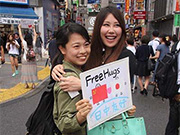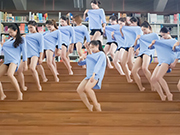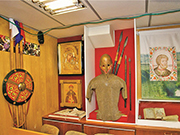

An exhibition on Jewish Refugees in Shanghai hangs at a travelling exhibition site in Canberra, Australia on June 8, 2015. The travelling exhibition is hosted by the Shanghai Jewish Refugees Museum to mark the 70th anniversary of the end of World War II. [Photo: CRIENGLISH.com]
2015 marks the 70th anniversary of the end of World War II. The Shanghai Jewish Refugees Museum has planned and designed a travelling exhibition on Jewish Refugees in Shanghai, which is currently on display in Canberra, Australia.
It is estimated that between 1933 and 1941, tens of thousands of Jewish refugees came to Shanghai.
Our Australia correspondent Wang Xiao has more details.
The exhibition Jewish Refugees and Shanghai was on display in Canberra Tuesday. The exhibition tells the story of how Jewish refugees escaped Europe, came to Shanghai and lived with local people. It also focuses on their new life after the end of World War II.
During the 1930s and 40s, millions of European Jews suffered under the persecution of the Nazis. Between 1933 and 1941, nearly 30 thousand Jewish refugees fled to Shanghai.
Peter Witting, an 87 year old, is the only Jewish survivor from Shanghai in Canberra right now. He was invited to the exhibition and shared his experience as a Jewish refugee. He said his most unforgettable memory about life in Shanghai was the warmth of the Chinese people during the hard times.
"The friendliness of the Chinese people. I was working with Chinese workman, and they are great friends. There is no anti-Semitism and it was a very harmonious relationship. It was wonderful. They saved our lives. "
In May 1939, Witting left Germany with his family, just four months before the Second World War broke out. Witting recalled that his father considered immigrating to the US or Australia, but they just couldn't wait for the visa. So his father decided to board the ship to Shanghai, the only place at the time which allowed free access for Jewish refugees without passports or visas.
The Wittings lived in Shanghai for 8 years until 1947. Witting went to school and also worked as a mechanic to supplement their life. Although it was a really hard time when they had to rely on relief assistance, Witting said they were lucky compared to their relatives in Europe.
"I am now 87 years old and looking back over my life I must say that I have been very fortunate in that our immediate family was able to escape from Germany before World War II and receive refuge in China, which saved us from almost certain annihilation in Europe. Whilst the war years were not easy, our experiences just cannot be compared with what many of our family members and compatriots had to endure in concentration camps of Europe. Many of our family members perished during the Holocaust."
This year marks the 70th anniversary of the victory of the World Anti-Fascist War, and Chinese People's War of Resistance against Japanese Aggression. The common hardship and friendship shared by the Chinese and Jewish has become a special bond that brings each other closer. Witting described the great suffer of Chinese people he witnessed in Shanghai during the war.
"The conditions in my time for the Chinese people were terrible. The way the Japanese treated the Chinese, the way the Chinese people suffered. People were dying on the street every night. There were corpses on the street, and in the morning they were collected and taken away. The hardships the poor Chinese people had to suffer were terrible."
Carol Keil, the president of the Australia China Friendship Society ACT Branch, which is also the co-host of the exhibition, said it's of great significance to collect the stories and share the memories.
"Many of the people in the Second World War are in their very late 80s and 90s, there are not many opportunities for them to see the exhibition. And also to get their memories and stories of what happened to them are very important. Tonight we have a lot of young people here, they are very happy to come and find it interesting especially the story about Peter."
Chinese Ambassador to Australia Ma Zhaoxu said in the opening ceremony of the exhibition that people need to remember the past, just in order to work together for the peace.
"70 years is mere a snap of the fingers. Today, as we remember our forefathers and history, we are not trying to nurse hatred, but to cherish world peace, renew friendship and push forward cooperation for a better future."
The last time Witting went back to Shanghai for a reunion was in 2006. He was fascinated with the tremendous change in China. Time flies. He can't even find the house he lived in or the streets he walked thousands of times. But the memories, the people, the warmth they offered, can't change, and will be remembered forever.
 |
Day|Week

 China’s ten most beautiful hiking trails
China’s ten most beautiful hiking trails Chinese and Japanese Youth Embrace in Tokyo
Chinese and Japanese Youth Embrace in Tokyo Legendary life of a bee-keeping master in Hainan
Legendary life of a bee-keeping master in Hainan Evolution of Chinese beauties in a century
Evolution of Chinese beauties in a century Creative graduation caps of ‘vigorous elves’
Creative graduation caps of ‘vigorous elves’ Catalan performers build human towers in Hangzhou
Catalan performers build human towers in Hangzhou Typhoon class strategic Submarine in photos
Typhoon class strategic Submarine in photos What are foreign leaders' favorite foods?
What are foreign leaders' favorite foods?